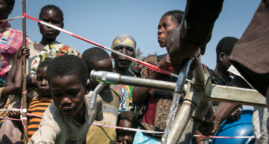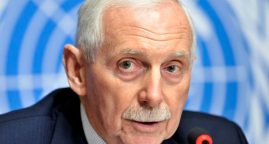Diplomacy Then and Now: Prevention is Always Better Than Treatment
Aid workers and healthcare providers working amidst the ravages of war understand all to well the crucial importance of stopping conflict through diplomacy and negotiation before it starts or escalates.
Perhaps no one advocated for preventive diplomacy more ardently than founding member of the Center for International Humanitarian Cooperation (CIHC) and former Secretary-General Boutros Boutros-Ghali. Yesterday, representatives of the United Nations Alliance of Civilizations (UNAOC) and CIHC joined together to commemorate the life and noble efforts of Mr. Boutros-Ghali.
At the event, Kevin M. Cahill, M.D., President of the CIHC and University Professor and Director of Fordham University’s Institute of International Humanitarian Affairs (IIHA), was part of a high-level panel together with H.E. Nassir Abdulaziz Al-Nasser, High Representative for UNOAC and Diplomat-in-Residence at the IIHA, Ambassador Maged Abdelaziz, Under-Secretary-General and Special Advisor on Africa, Tomas Christensen, Chef de Cabinet of and Ambassador Amr Aboulatta, Permanent Representative of Egypt to the United Nations.
“Almost in the role of a public health professional, he opened his talk by noting that in matters of peace and security, as in medicine, prevention is self-evidently better than cure. It saves lives and money and it forestalls suffering,” said Dr. Cahill of Mr. Boutrous-Ghalis’ powerful address at the 1995 UN Conference.
Dr. Cahill served as Mr. Boutros-Ghali’s physician and personal advisor for many years, including during his time as UN Secretary-General. Mr. Boutros-Ghali was also a founding member of the CIHC in 1992, which is now celebrating its 25th year.
His approach to preventive diplomacy was guided by four elements: fact-finding, confidence building, early warning and preventive deployment.
“He described preventive diplomacy as ‘action to prevent disputes from arising between parties, to prevent existing disputes from escalating into conflicts and to limit the spread of the latter when they occur’,” said Mr. Al-Nasser.
Mr. Boutros-Ghali’s landmark 1992 report, An Agenda for Peace, has become a guiding document for diplomats and UN representatives in their pursuit of sustainable social peace throughout the world..
“In our ever more dangerous world, in the throes of both inter- and intra-state conflicts, the need for a new approach in international relations, seems obvious. Preventive Diplomacy should deal with — and even direct — where a nation can move towards peace rather than replaying where it has been in endless wars. That surely was our intention in promoting this option, and neither Boutros nor I ever abandoned that dream,” concluded Dr. Cahill in his speech.
Twenty-five years later as the international community struggles to remedy and end dire conflicts and complex humanitarian crises in Iraq, South Sudan, Syria, Yemen, and beyond world leaders should be reminded of this call to action.
Related Articles
DR Congo: UN warns of spike in displacement amid funding shortfall
03/09/2018. The United Nations migration agency is hoping that the upcoming donor pledging conference for the humanitarian crisis in the Democratic Republic of the Congo (DRC) will generate more financial support to cope with a spike in the number of people displaced by violence.
“The lack of global leadership makes very dangerous the situation”
12/05/2015. Discover the vision of Thierry de MontbriaL on geo-political perspectives of the international scene.
IOM DG Swing’s Statement at the Syria Brussels Conference
04/05/2017. “The future of Syria will be grim if current needs are not being addressed with a greater sense of urgency.”





